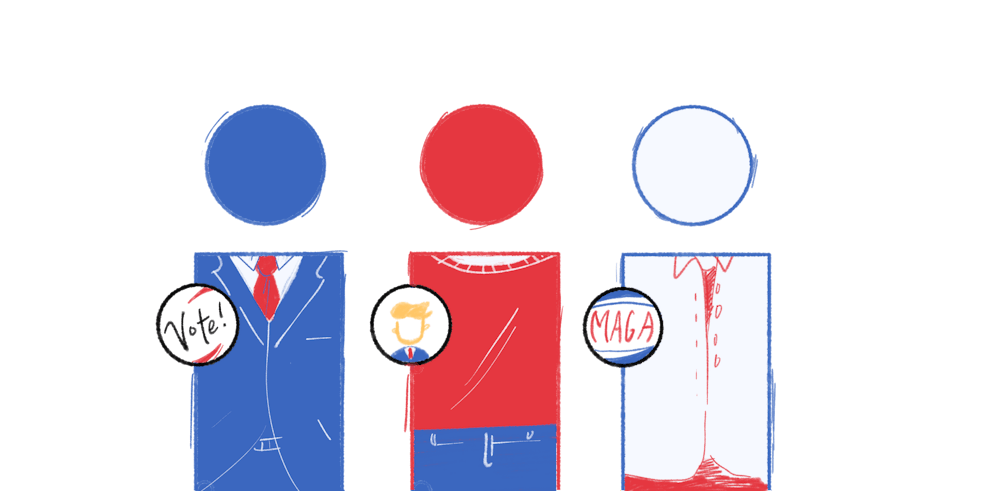Following the 2024 presidential election, national media reported that many Latino men showed support for President-elect Donald Trump, indicating a shift in Latino voting patterns. However, for some Latino men at Emory University, the results of the election were disheartening — they served as a reminder of the greater challenges that they encounter while trying to balance traditional expectations, emotional openness and societal pressures.
Julio Medina (13C), an assistant professor in the dance and movement studies program, elaborated on how the election emotionally impacted him.
“I'm not surprised, but what’s scary is that … more people voted for Trump than I thought,” Julio Medina said. “That just tells me about where people's priorities are, where their intelligence is, and that is a little scary.”
According to Julio Medina, the change in political dynamics goes beyond mere policy disputes — it reflects a more profound societal trend in Latine culture, one that is deeply embedded in patriarchal systems that frequently suppress emotions, especially among men.
Julio Medina navigated the intersections of masculinity and emotional expression by describing his cultural and familial influences. Growing up in a household where emotional vulnerability was often subdued, he noted how his father showed affection but rarely allowed himself to express grief or vulnerability.
“I didn't grow up in a toxic masculine household … but I feel like I have friends who did,” Julio Medina said. “Their masculinity impacted their views on women, or how they position themselves as the leader of the home or the breadwinner, and how that would influence their politics.”
This approach to emotional expression stems from colonization, Julio Medina explained.
“They are Western notions of patriarchy and what it means to be male,” Julio Medina said. “Those ideas have been passed on to us by force, and we’ve maintained them subconsciously.”
Like Julio Medina, Taylor Colorado Merino (26C) attested to how traditional notions about masculinity in the Latino community have influenced him. Although he said he openly expresses his emotions, he acknowledged the difficulties that some Latino men encounter when it comes to showing their feelings.
“I've come a long way from separating myself from traditional notions of masculinity within the Latine community, just because it's very always machismo, very much you have to put up a strong front,” Colorado Merino said. “But I've been one to embrace my emotions. I'm not afraid to cry in public.”
As more Latino male voters shift toward the Republican Party, understanding the connection between masculinity and political beliefs is becoming more significant. Colorado Merino noted that certain Republican values resonate with Latine views on masculinity, especially within more traditional families. Julio Medina expressed a similar sentiment, explaining that in a world where cultural and familial influences shape political views, men navigating emotional expression within a patriarchy may let that influence their political beliefs.
“How masculinity is viewed has swayed political ideologies for the Latine community,” Colorado Merino said. “Leftist views are seen as not the norm within traditional masculinity of Latino communities, but to an extent. It really depends on how you grew up.”
As Colorado Merino reflected on the election results, he observed that many of his family members, especially those from older generations, held onto more conventional ideas about masculinity and politics. However, he is beginning to grasp a perspective that values the community’s well-being above personal pride.
“A lot of the time, men don't want to get help, because they feel like, ‘Oh, it's my responsibility to carry the burden, or do things on my own,’” Colorado Merino said. “That’s the downfall of it. If you can't see the importance of community, how are you going to vote for things that are for the community?”
At the intersection of community and familial support is the personal experience of Anthony Medina (22Ox, 25B). Anthony Medina’s upbringing diverged from what is considered typical in the Latine community, influenced by connections between Hispanic culture, masculinity and mental health. Raised in a family led by his mother, Anthony Medina was encouraged to openly share his feelings and to prioritize mental health in his own life.
“Hispanic culture has this sentiment of machismo, where the man is the one in charge of the family household, but my father isn't necessarily like that,” Anthony Medina said. “We have a matriarchal family dynamic, and my dad has really instilled the importance of having an open conversation with my mother and making sure that everybody's voice is heard in our family unit.”
Anthony Medina acknowledged the cultural pressures that come with being a Latino man, especially within a culture that values collective unity.
“Hispanic families think that we have one another, so we don't necessarily need external help,” Anthony Medina said. “We're a family unit. We tackle this together. We lose together. We win together. We accomplish together. … Taking our problems to maybe an external third party, there is some kind of ‘What's going on?’ type of feeling.”
While Anthony Medina recognized the value of familial support, he also noted the barriers that many men in his community face when it comes to seeking mental health care, including financial obstacles. For him, these struggles are compounded by political ideologies that often generalize collective responsibility.
“There's always an opportunity to raise awareness of this and, as a society, really strengthen the feeling that it is socially acceptable,” Anthony Medina said. “We can take part in mental health and practices and still not detach from our families.”






